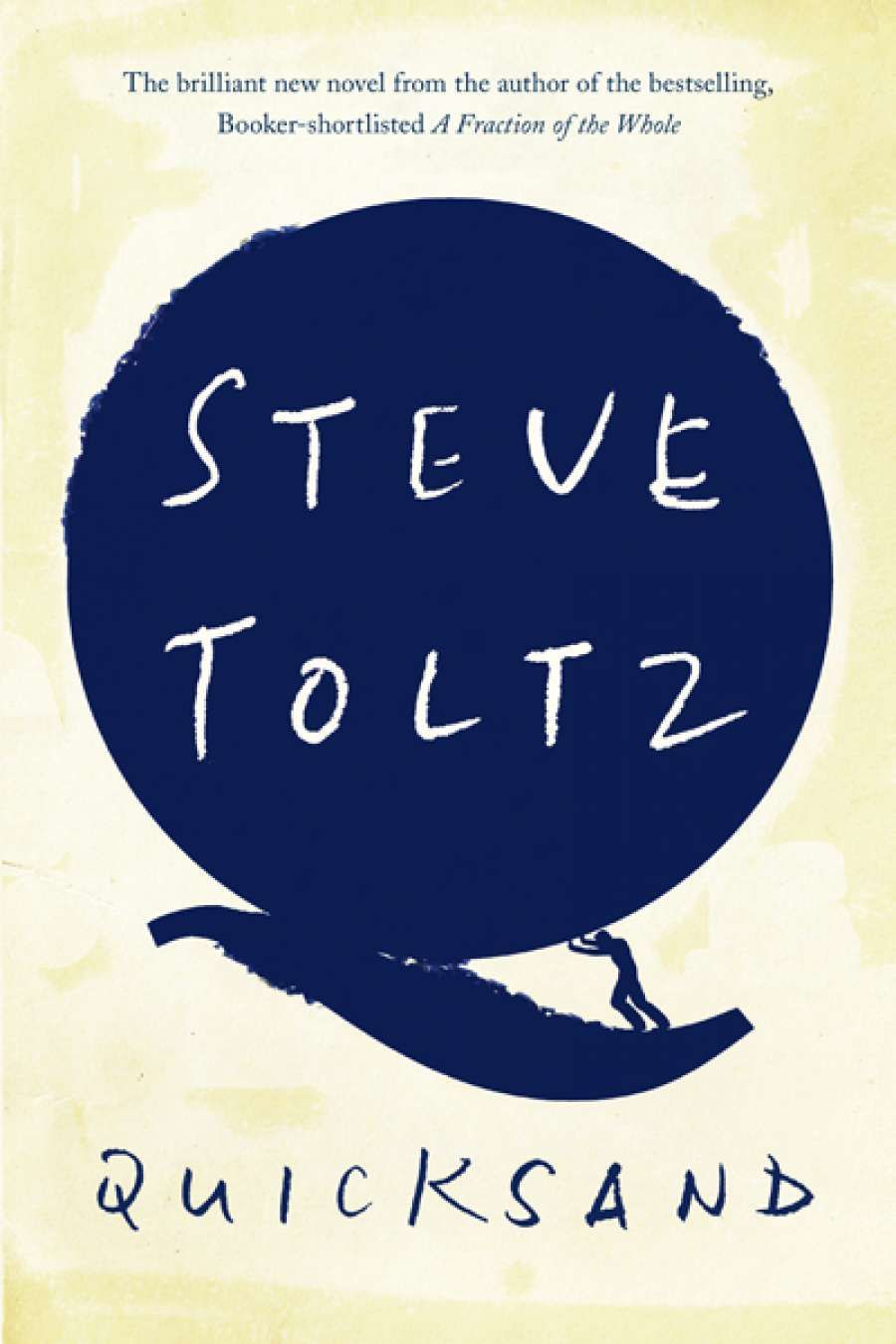
- Free Article: Yes
- Contents Category: Fiction
- Custom Article Title: Chris Flynn reviews 'Quicksand' by Steve Toltz
- Review Article: Yes
- Custom Highlight Text: Penguin Australia’s recent fiction output has been remarkable...
- Book 1 Title: Quicksand
- Book 1 Biblio: Hamish Hamilton, $32.99 pb, 435 pp, 9781926428680
Conventions of plot and structure are eschewed,and are not missed. The pace is frenetic from the outset, and does not let up for a moment. There are enough story ideas in the first two chapters to keep a dozen authors in clover for decades. Such is Toltz’s gift (some may say curse) that witnessing such a vivid imagination at play is exhausting and occasionally overwhelming.
Benjamin’s freewheeling life of disaster, of one failed business venture after another (disposable toilets, tanning-salon taxis, maternity clothes for goths), is recorded for posterity by his best friend from high school, Liam Wilder, a failed writer who accidentally became a competent, unambitious policeman. The initial passages wherein Wilder thrashes around seeking inspiration for a bestselling tome are extremely funny, and scathing with regard to writers and the artistic life. ‘When a writer is born into a family, that family is doomed!’ as such creatures possess, ‘an irresistible curiosity that gives you the moral right to eavesdrop or stalk almost anyone on the planet earth.’ Editors even get a nod: ‘if you’re not a good editor, you’re like a battlefield surgeon reattaching the wrong arm.’
This framing of Benjamin’s story as a book within a book is an effective literary device, allowing the reader to witness the awful clumsiness of a man who never has any luck through the eyes of a cynical scribe, himself one step away from abject failure. Wilder records Benjamin’s life as a last resort, after, ‘dodging success with drone-like precision for over twenty years’. Writing what he knows is tantamount to giving in to mediocrity, a clever meta-commentary that Toltz sprinkles throughout the text. ‘Although at times I felt a fraud, I had settled into a life I’d always feared yet secretly desired, a life uninterpreted and unencumbered by art.’
Toltz’s true agenda, or at least one of many, becomes apparent as the narrative is taken over by Benjamin in the book’s second half. Here, Benjamin’s high-functioning maniacal genius is given free rein, as he defends himself in a murder trial. To say this section is a tour de force is to understate the madness of almost 200 pages of prose, in which Benjamin’s stream-of-consciousness vernacular, a helix of style and form, coalesces around a simple question: what is art, and where does it come from? As Toltz the author must have been asked a thousand times since his Man Booker Prize-shortlisted début, A Fraction of the Whole (2008), where do you get your ideas?
‘Part Chuck Palahniuk, part David Foster Wallace, part Thea Astley, and, really, so distinctly Toltzian’
It is a lovely, knowing way of approaching the supposedly difficult second novel. Toltz clearly has no shortage of ideas; in fact, Quicksand has a thousand dazzling throwaway moments of brilliance. For example, during Benjamin’s courtroom diatribe he confesses, ‘I’m always misjudging circumstances. Like the time I went for a job interview and the manager asked what would I say is my greatest asset and I answered: I can sleep anywhere!’ No sooner has the pleasure of such a faux pas been absorbed than we are on to the next one. The pace is relentless.
That there is more humour in a single Toltz book than in the rest of the year’s Australian fiction combined perhaps speaks more to literature’s determination to affect a serious demeanour in order to be taken seriously, but it is worth celebrating the author’s wit, and bravura. This could be the funniest book ever to win the Miles Franklin, although it might equally win nothing. Much like his first book, Quicksand will polarise opinion, and as such it is exactly the sort of novel we might hope for and expect from this singular artist.
‘This could be the funniest book ever to win the Miles Franklin, although it might equally win nothing’
Benjamin’s fate is predetermined. From the opening passage, we know he ends up as a disabled man who may or may not be invulnerable. He is a modern Antipodean Sisyphus, a battler who becomes the subject not just of an author seeking inspiration, but of painters, sculptors, surfers, doctors, women, religious nuts, debtors, jailers, conmen, and criminals of all stripes. Along the way there are long, banter-filled passages between Benjamin and crackpot photographer Mimi Underwood, their messy sexual relationship reminiscent of that between Tyler Durden and Marla Singer in Palahniuk’s Fight Club (1996), as well as a brutal spell in prison alongside Mimi’s vengeful husband, which spares us none of the gory details.
Where does such a book come from? The mind of an unhinged muse not unlike Aldo Benjamin, or the imagination of a writer blessed with a touch of genius? In the end, it doesn’t matter. One might argue they are one and the same. Toltz pushed his rock to the top of the slope with A Fraction of the Whole, then watched it roll back down again. He started over, and with Quicksand has reached the summit once more.


Comments powered by CComment